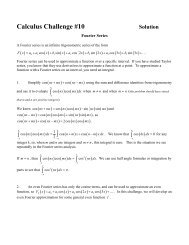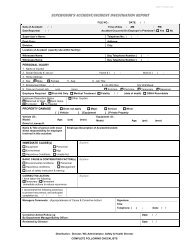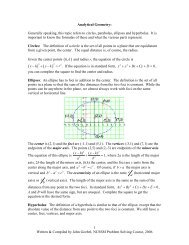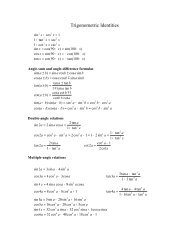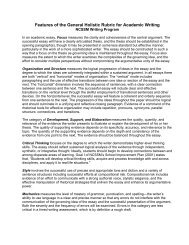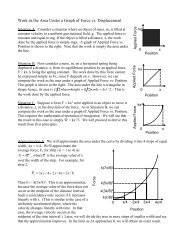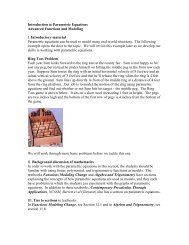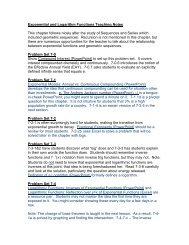NCSSM COURSE CAtAlOG - North Carolina School of Science and ...
NCSSM COURSE CAtAlOG - North Carolina School of Science and ...
NCSSM COURSE CAtAlOG - North Carolina School of Science and ...
Create successful ePaper yourself
Turn your PDF publications into a flip-book with our unique Google optimized e-Paper software.
to modern-day novels <strong>and</strong> short stories are examined. We explore the<br />
development <strong>of</strong> such nations as Egypt, Ethiopia, Algeria, Morocco, Mali, Nigeria,<br />
Ghana, Congo, Kenya, <strong>and</strong> Tanzania. Students develop <strong>and</strong> sharpen their skills<br />
in reading, critical thinking, academic writing, <strong>and</strong> they make rhetorical <strong>and</strong><br />
oral presentations in both African <strong>and</strong> Western traditions.<br />
EN426 Africa II: Critical Issues in Central <strong>and</strong> Southern Africa<br />
One trimester<br />
Credit: One unit core English credit, one unit core elective credit.<br />
Prerequisite: Completion <strong>of</strong> three trimesters <strong>of</strong> AS303 Writing <strong>and</strong> American<br />
Studies or AS305 American Studies or completion <strong>of</strong> two trimesters <strong>of</strong> AS303 or<br />
AS305 <strong>and</strong> permission <strong>of</strong> the Dean <strong>of</strong> Humanities.<br />
Meeting pattern: Four periods per week including lab.<br />
This double-credit, interdisciplinary, team-taught course uses present-day critical<br />
issues in Central <strong>and</strong> Southern Africa as lenses for examining the history <strong>and</strong><br />
culture <strong>of</strong> those regions. Starting with current issues such as the Civil War in the<br />
Congo, wildlife <strong>and</strong> resource conservation, <strong>and</strong> the HIV/AIDS epidemic, we<br />
explore the roots <strong>of</strong> these issues in such topics as climate <strong>and</strong> geography <strong>and</strong><br />
their impacts on culture; the origin <strong>of</strong> humans <strong>and</strong> the development <strong>of</strong> human<br />
societies; the importance <strong>of</strong> oral traditions; <strong>and</strong> religious, ritual, <strong>and</strong><br />
cosmological belief systems. We also explore the rise <strong>of</strong> trade networks along<br />
the tropical belt <strong>and</strong> the Swahili coast, medieval Southern <strong>and</strong> Central African<br />
kingdoms, the impact <strong>of</strong> the Atlantic slave trade, European colonization, anticolonial<br />
movements, independence <strong>and</strong> post-independence experiences, <strong>and</strong><br />
the rise <strong>and</strong> fall <strong>of</strong> the Apartheid system. Literature from ancient poems <strong>and</strong><br />
songs to modern-day novels <strong>and</strong> short stories are examined. We explore the<br />
development <strong>of</strong> such nations as Namibia, Botswana, Congo, Angola,<br />
Zimbabwe, <strong>and</strong> South Africa. Students develop <strong>and</strong> sharpen their skills in<br />
reading, critical thinking, academic writing, <strong>and</strong> they make rhetorical <strong>and</strong> oral<br />
presentations in both African <strong>and</strong> Western traditions.<br />
EN430: Latin America I: Pre-Columbian <strong>and</strong> Colonial Periods<br />
One trimester<br />
Credit: One unit core English credit, one unit core elective credit.<br />
Prerequisite: Completion <strong>of</strong> three trimesters <strong>of</strong> AS303 Writing <strong>and</strong> American<br />
Studies or AS305 American Studies or completion <strong>of</strong> two trimesters <strong>of</strong> AS303 or<br />
AS305 <strong>and</strong> permission <strong>of</strong> the Dean <strong>of</strong> Humanities.<br />
Meeting pattern: Four periods per week including lab.<br />
This double-credit, interdisciplinary, team-taught course is a survey <strong>of</strong> Latin<br />
America from the pre-Columbian era to the early nineteenth century. Students<br />
explore the development <strong>of</strong> the Olmec, Mache, Nazca, Mayan, Incan, <strong>and</strong><br />
Aztec civilizations, among others indigenous to the Americas in the eras prior to<br />
19




